The White House has denied a report that President Donald Trump tried to persuade the FBI to end its investigation into former aide Michael Flynn.
It's not the only Trump crisis of the last 24 hours, coming hard on the heels of the news that the president shared sensitive material with Russian diplomats.
The bombshell memo and the 'I' word
Donald Trump is discovering just how dangerous an adversary James Comey can be.
A person doesn't rise as high as Mr Comey did in the federal government without learning how to cover his, er, posterior.
With this latest bombshell from the New York Times it's clear that the former FBI director, who was unceremoniously sacked by the president, is poised to enjoy the last laugh. Thanks to his propensity for memo-writing, he may have constructed an arsenal capable of mortally wounding the Trump presidency.
At the moment the White House is denying Mr Comey's reported characterisation of the conversation the two men had shortly after the president fired Michael Flynn. In a "he-said, he-said" situation, however, the man who wrote contemporaneous documents - memos plural - will have the upper hand.
Add that Mr Comey has a reputation for independence, and the face-off looks even more ominous for the president. As deputy attorney general, Mr Comey stood up to the Bush administration during a showdown over the legality of a government surveillance programme. He also withstood withering criticism from Democrats over his handling of the Hillary Clinton email server investigation last year.
If he swears to a congressional committee that the president put undue pressure on him to end an ongoing Flynn investigation, his word will pack a punch.
The "I" word - impeachment - has already been broached by politicians as moderate as independent Senator Angus King of Maine. If this were a Democratic-controlled House of Representatives, articles of impeachment would likely be in the drafting process.
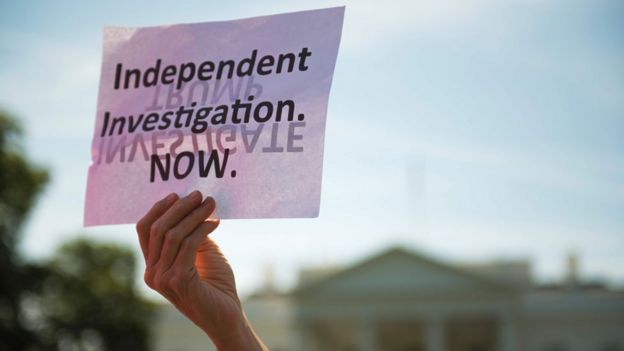 AFP
AFP
Republicans still call the shots in Congress, however, and it's a significant leap to get them to abandon the Trump presidency and any hope of advancing their agenda for the foreseeable future. But some, like Senator John McCain - who said this has become a scandal of "Watergate size and scale" - are clearly wavering.
The former Republican presidential nominee is a bit of a wild card, of course. For the rank-and-file to turn on the president will require them to admit their complicity in a failed presidency.
They rallied behind Trump at the Republican National Convention. They looked past his feud with a Gold Star family and his disparaging attacks on Alicia Machado, the former beauty queen. They bit their tongues after the Access Hollywood video. They may have supported other candidates during the Republican primary, but they carried Mr Trump's water through the general election. Now the well is running dry.
Donald Trump may yet survive these revelations. Mr Comey's memos could turn out to be paper tigers, with teeth not nearly as sharp as Tuesday's sneak preview indicated. He could, under oath, soft-pedal his conclusions. Republicans might decide it's better to stick with the president than run for the exits.
At the very least, however, it's becoming clear that Teflon Don is no longer untouchable. His future is no longer clear. A storm is brewing, and it's going to get worse for their party before it gets better.
Sharing secrets with Russia
The Trump White House has now settled on its defence of the president's meeting with the Russian delegation, in which he reportedly revealed classified information to his guests.
In a series of tweets on Tuesday morning the president framed any disclosure of intelligence information as a calculated move to advance US national security priorities.
In a press conference hours later, National Security Adviser HR McMaster said Mr Trump's revelations were "wholly appropriate".
This was always going to be the most effective response, as the president has broad powers to declassify whatever he deems necessary. As the old Richard Nixon line goes: "When the president does it, that means it is not illegal".
The president's explanation is not absolution, however. A wave of the hand on Twitter isn't going to make this story go away any time soon. Here are six reasons why.
1. High crimes and misdemeanours
The impeachment question has been mentioned in this case too. Shortly after the Washington Post story detailing the allegations broke, there were cries of "treason" from Mr Trump's more vociferous critics and calls for immediate removal from office.
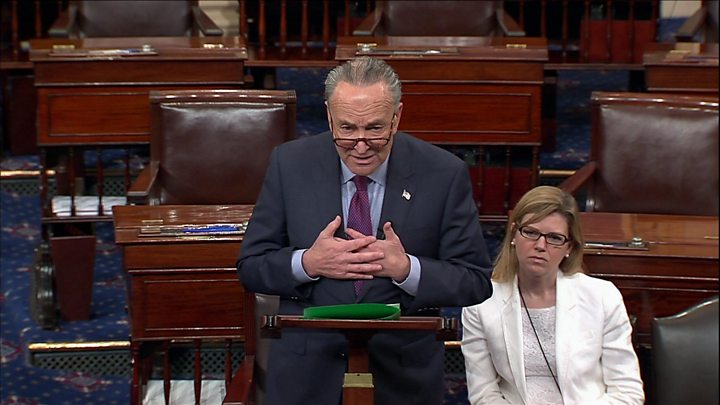
The charge that Mr Trump, through ignorance or boastfulness, casually disclosed highly classified intelligence for no reason may not be a criminal offence, but that doesn't mean it wouldn't create a political controversy that could, in a worst-case scenario for the president, end in his impeachment.
The process for impeachment for "high crimes and misdemeanours" as outlined in the US constitution is a political act. A simple majority of the House of Representatives can impeach, initiating a trial in the Senate and a two-thirds vote necessarily for removal.
As the writers of Lawfare Blog point out, Mr Trump's opponents could accuse him of violations of his oath of office to "preserve, protect, and defend" the US constitution - a catch-all category cited in the three previous times a president has been seriously threatened with impeachment.
Just because it's possible, however, doesn't mean it's likely. And again, it has nothing to do with the law and everything to do with politics - and how the story plays out from here.
2. The Russian factor
Like Indiana Jones looking at a chamber full of snakes, many in the Trump White House must be muttering to themselves: "Russians. Why did it have to be the Russians?"
Allegations of cosier-than-desired relations with the US geopolitical adversary have bedevilled Mr Trump since the early days of his presidential campaign.
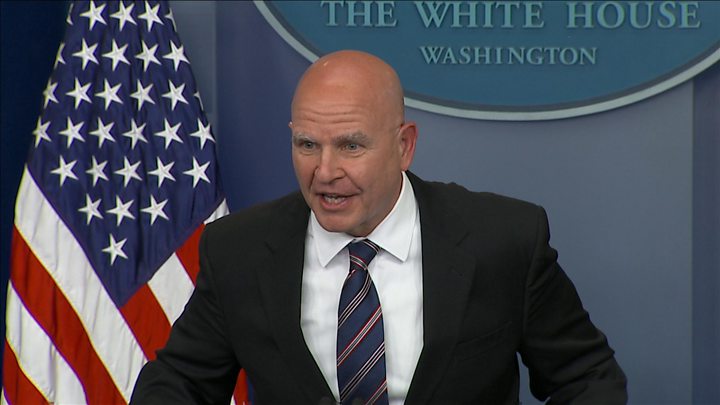
He's been questioned about the praise he's lavished on President Vladimir Putin, some of his aides are caught up in the ongoing investigation into Russian meddling in the US 2016 election, his attorney general was forced to recuse himself because of an undisclosed meeting with Russian Ambassador Sergei Kislyak and his first national security adviser was fired for obfuscating about his Russia ties (and is one of the people under FBI investigation to boot).
All of this was hanging in the air as Mr Trump met with Mr Kislyak and Russian foreign minister Sergei Lavrov last week, just hours after he fired James Comey, the FBI director overseeing the Russia investigation. US press was barred from attending, and the only photos that were released came from the Russian state-run news service.
It was never going to be a good look. Now, in light of the Washington Post's revelations, it's a terrible one.
Mr Trump's tweets explained that he was "sharing" information with the Russian officials in order to foster co-operation on important global issues like the fight against the so-called Islamic State. As Mr Trump points out, he has the "absolute right" to do so.
The fact that it's the Russians involved, however, means the story will pack that much more powerful a punch.
3. Sceptical allies
Back in January Israeli newspaper Yedioth Ahronoth reported that Israeli intelligence officials were concerned about sharing sensitive information with the Trump administration because of "fears of a leakage" to Russia.
Yeah, about that...
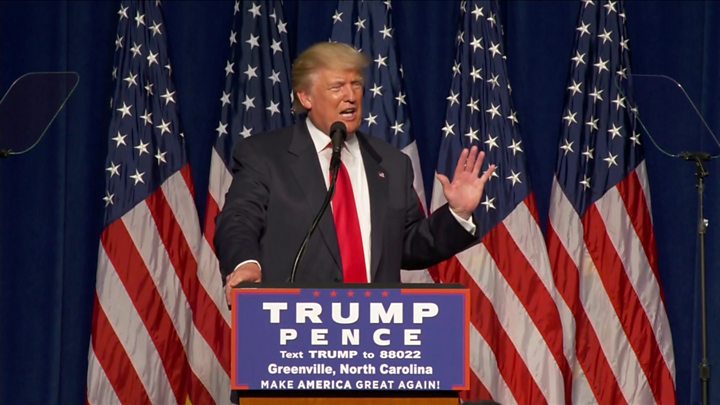
According to the Washington Post report, Mr Trump may have disclosed information provided to the US by a "key ally" that has "access to the inner workings of the Islamic State". According to multiple news reports that ally was none other than Israel.
That fits in with the Post's original story, which did not identify the ally but said "it has previously voiced frustration with Washington's inability to safeguard sensitive information related to Iraq and Syria". One US official said it was potentially a "blow" to the US relationship with that ally.
Israel's ambassador in Washington has since said it has "full confidence in our intelligence-sharing relationship with the US", but the damage may be done. If key US allies become reluctant to share intelligence data with the US, that would be a significant blow to the nation's national security - even if the details of this particular story are never fully established.
Off the record, one Israeli intelligence official told Buzzfeed News that the story is "our worst fears confirmed".
Throw in last week's Trump tweet implying that he - or someone - may have "tapes" of conversations made in the White House, and the result may be a chilling effect on US foreign relations across the board.
4. A leaky ship of state
 GETTY IMAGES
GETTY IMAGES
This sharing of classified information with the Russians should also be viewed in the context of what has become a simmering feud between the president and members of the intelligence community.
Shortly after he tweeted out that two-part explanation of his White House meeting with the Russians, Mr Trump sent another message on a familiar theme - leaks.
"I have been asking Director Comey and others, from the beginning of my administration, to find the LEAKERS in the intelligence community..."
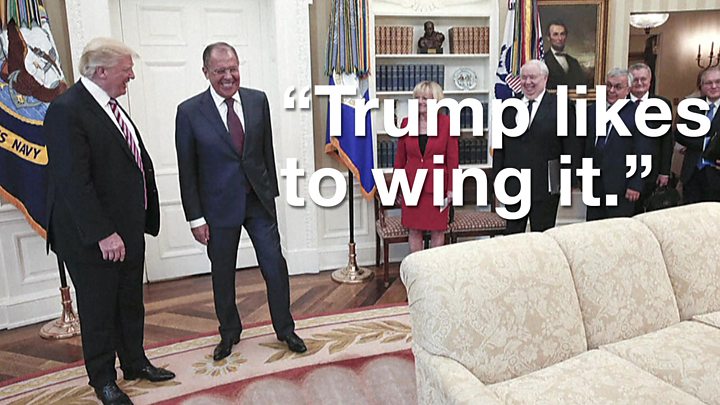
Back in January then-President-elect Trump sent a tweet comparing leaky intelligence agencies to Nazi Germany.
The president is clearly angered by what he views as a litany of embarrassing disclosures -about phone calls with leaders of Australia and Mexico, conversations his national security adviser had with the Russian ambassador and salacious details from a Trump-Russia dossier circulated among intelligence officials.
The president has threatened massive re-organisation of the US intelligence bureaucracy and an aggressive investigation into the source of the leaks - and it appears members of that community are striking back.
5. The Republican conundrum
Monday evening, upon hearing of details about the Washington Post story, Republican Senator Susan Collins of Maine echoed a familiar lament.
"Can we have a crisis-free day?" she said. "That's all I'm asking."
On Tuesday morning Senate Majority Leader Mitch McConnell offered a similar take.
"We could do with a little less drama from the White House on a lot of things," he told Bloomberg Television, "so we can focus on our agenda, which is deregulation, tax reform and repealing and replacing Obamacare."
A few of the Republican usual suspects who have been more outspoken in their criticism are continuing on that tack.
Congressman Justin Amash of Michigan tweeted that the White House should share "details of the president's meeting" with Congress.
Once again Senator John McCain of Arizona found something the president did "deeply disturbing".
Barring further revelations, however, the president has constructed a defence around which Republicans can rally. While members of Mr Trump's party may grouse about the ongoing administration fiascos, previous complaints have been followed by inaction. Until there is evidence to the contrary, this time looks to be no different.
6. The trust gap
Last week reporters raged over the fact that White House officials, from Vice-President Mike Pence on down, put forward an explanation regarding why the president had fired FBI Director James Comey that was completely undercut within moments of Mr Trump opening his mouth in a sit-down interview on Thursday with NBC News.
The president would later tweet that because he is a "very active president" his press team can't be relied upon to convey his positions with "perfect accuracy".
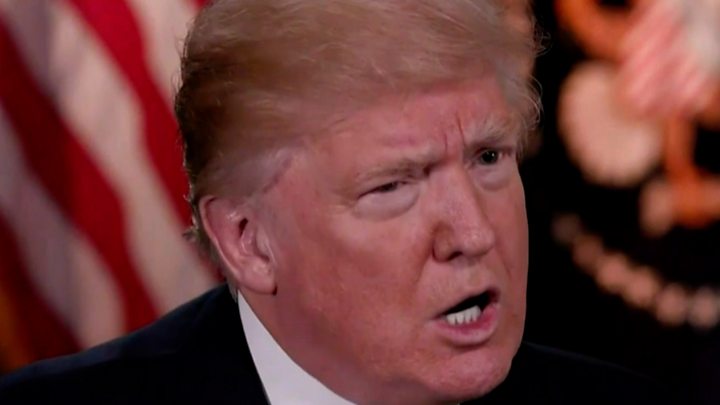
"Why were so many people giving answers that just weren't correct?" Jonathan Karl asked Deputy Press Secretary Sarah Huckabee Sanders. "Were you guys in the dark?"
Needless to say reporters this week took the early White House spin that Mr Trump only discussed "common threats" with the Russians, per Deputy National Security Advisor Dina Powell, with more than a grain of salt. It appears their scepticism was at least partially validated when, on Tuesday morning, Mr Trump said he had shared "facts pertaining to terrorism" with Russia.
Presidents and the media typically have an adversarial relationship, but this White House is rapidly burning through any residual goodwill it may have had.
Given that Mr Trump and his team often refer to the press as the "opposition party", however, they may not lose much sleep over this development.
/BBC








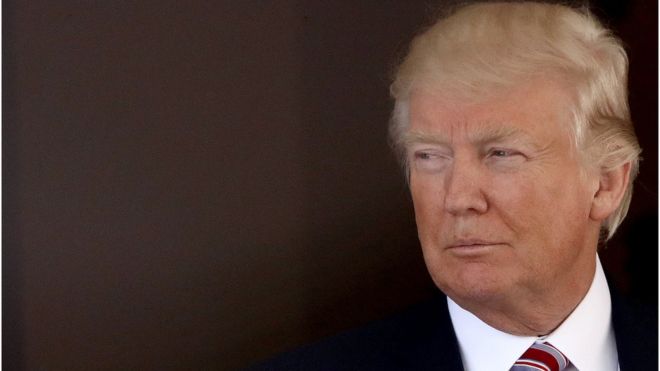
No comments :
Post a Comment